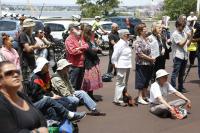Aboriginal activists rallied on the steps of parliament house in Perth on November 12 to protest against the Western Australian government’s plan to close 150 remote Aboriginal communities. The rally also condemned the federal government’s plan to cut funding to 180 remote indigenous communities in Western Australia.
READ MORE: COLIN BARNETT 'HELL-BENT' ON DESTROYING COMMUNITIES
Bropho, from the Swan Valley Nyungah community, told the rally: “Closing down these communities will only make more people homeless and [in] despair.
“The way we choose to live should be our choice. We shouldn’t have the domination of government people telling us how to live and where to live. We will fight to get our community and our land back. Our fight will continue.”
In an open letter to Colin Barnett on November 17, Nyungah activist Iva Hayward Jackson said that only a small amount of the revenue from the mining would be needed to cover the costs of maintaining these communities and other improvements and that “it’s only fair to share in the richness of the land with the idea of equality in the treatment of Aboriginal people.
"After all, Aboriginal people are the traditional ‘owners’ of the land and waterways that holds all the precious resources that made Australia a rich and wealthy country in the modern world.”
Amnesty International released a statement urging the Western Australian government not to forcibly evict Aboriginal people from the communities, as demolishing houses and denying indigenous people the right to practice their culture is a breach of human rights and international law.
Tammy Solonec, a human rights lawyer working with Amnesty International, slammed the hypocrisy of Western Australian Premier Colin Barnett for admitting that closing the communities will be traumatic for the people involved, while continuing a policy that will force indigenous people to break their connections to land and culture and force them to move to larger towns where they will have greater exposure to drugs, alcohol, violence and crime.
Solonec reminded Barnett of his recent pledge to reduce the rates of indigenous incarceration and said that research had shown that supporting Aboriginal people to live in their country improved their life expectancy and health; reduced the rates of domestic and other violence; allowed indigenous people greater independence; and provided them with greater connection to their land and culture.
Western Australian Socialist Alliance co-convener Alex Bainbridge slammed Prime Minister Tony Abbott’s statement that “Sydney was just bush” before the white invaders arrived. “Disrespect for Aboriginal culture is rampant,” he said.
“This year we have active campaigns to defend Aboriginal heritage, to stop Black deaths in custody and to stop a new stolen generations as child protection authorities seize Aboriginal children in record numbers.”
He condemned the state government’s moves to close the communities without consultation as an outrage and confirmation that dispossession of Aboriginal people is not a relic of the past but an ongoing and contemporary reality. He called for funding to ensure the communities’ survival and for the funding to be administered in such a way that the communities can determine their own futures.


The smaller a community, the less likely suicide
The smaller a community, the less likely suicide